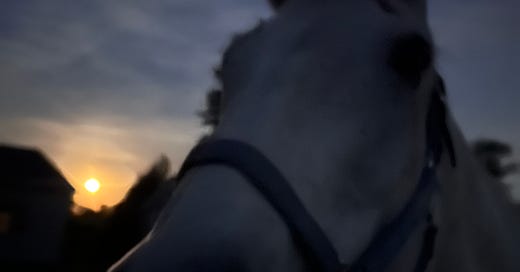The way we communicate with horses reflects our understanding of their experiences and needs. Phrases like “Good Boy” or “Good Girl” are commonly used expressions of affection heard in many barns, and I often use them myself. However, I sometimes question whether these phrases accurately describe the horses, particularly senior horses.
Hunter, a 31-year-old cross thoroughbred, has faced various physical challenges throughout his life and has a complex history. Despite not looking his age, his body reveals the effects of time. He suffers from severe arthritis in his hocks, some of his teeth are no longer functional, and he has experienced swelling in the sacroiliac region, ironically called “Hunter’s bump.”
Hunter is not a boy! I choose to address him as 'Sir,' 'Wise One,' or 'Chief' to honor his seniority and wisdom. I am consciously adapting my language to reflect a more respectful form that acknowledges his life journey. This approach not only pays tribute to his past but also recognizes his current status. I believe that the way we use language influences our relationships, and being mindful of how we address horses can enhance our connection and understanding with them.
Horses are sentient beings with the capacity for subjective experiences, feelings, and awareness. They can feel pain and pleasure, and they possess thoughts and emotions. While humans are commonly recognized as sentient, they have way too much self-importance! Horses have been tolerating us for centuries.
When I met Hunter in February 2024, he was disinterested in humans and checked out like so many senior "forgotten" horses. Just as there is an aging equestrian community, there exists a growing population of elderly horses that are no longer competing and lack a clear purpose with no job. These horses, often kept in paddocks with other seniors, have valuable experiences and insights to share with younger horses.
This situation may be reflective of a broader societal context. Approximately 22 percent of the American population is 60 years of age or older. Many older adults continue to live in their own homes, often receiving support from family members, caregivers, or home health services. Some may choose to downsize to smaller residences that better suit their needs, while others relocate to retirement communities or independent living facilities.
It is relatively rare for horses to have a well-defined retirement plan. Most owners will find a less expensive boarding facility or worse, try to sell them. After years of dedication and service to humans, many horses may find themselves abandoned or without a clear role and considered “valueless.”
Through my experience as a therapeutic instructor, I have discovered that connecting senior horses with children is mutually beneficial. Many senior horses respond positively to this interaction. Hunter is a different horse! He acts younger and shows up for his new job! He loves the children!
Although I am trained in therapeutic riding instruction, I have observed that unmounted activities yield powerful results, more so than riding instruction. I have also noticed horses adapt and respond to the emotional needs of children seeking support. This adaptability is attributed to their social nature and intuitive understanding of body language and emotions. Horses can pick up on cues such as body language, tone of voice, and emotional states when interacting with children in need of assistance. While this may not apply to every horse, my experience suggests that many senior horses tend to excel in these therapeutic roles.
As horse owners, trainers, riders, and enthusiasts, we have a responsibility to care for our horses during their senior years, which I refer to as their "Golden Years." Although they may no longer be used for riding, senior horses can be excellent partners and teachers, not only for children but also for individuals dealing with anxiety, depression, and emotional challenges. Learning basic communication skills with a horse can be beneficial for anyone facing such issues.
It is important to reconsider the concept of ‘retiring’ horses. Much like humans, horses thrive when they are active, engaged, and have a sense of purpose. When horses are given meaningful roles, they can flourish.
By changing the way we refer to senior horses—beyond terms like "Good Boy" or "Good Girl"—we can become more attuned to their needs. This heightened awareness can strengthen the bond between humans and horses and create a nurturing environment for older equines. Retirement, as a concept, is rooted in human perspectives rather than being inherent to horses. It is time to adopt a new language that acknowledges the value and potential of senior horses, ensuring they receive the best care and can thrive in their environments.
Camron Adibi is an Equine-Human Behaviorist and a PATH Certified Therapeutic Riding Instructor, holding a master's degree in education from Gordon College. He specializes in guiding children to reconnect with themselves and others through unmounted interactions with horses. By tapping into the emotional intelligence of horses, children cultivate emotional resilience and boost their confidence. They learn to regulate their emotions, trust their instincts, and more comfortably express their true selves. In a calm and supportive environment, children gain a deeper understanding of themselves, develop healthier relationships, and navigate a world that can often feel overwhelming. This work focuses not on riding but on building connection. Through gentle and grounded experiences, children discover their voice, build trust, and step into their full potential. www.camronadibi.com





Lovely post. I acknowledge Gaela and Bullseye as 'friends'...Good morning, my friend...
Thank you, my friend...they understand and greet me as theirs as well.
Unmounted play is my world!
So true - seen it happen many times, the benefit a senior horse can be for children and teens.